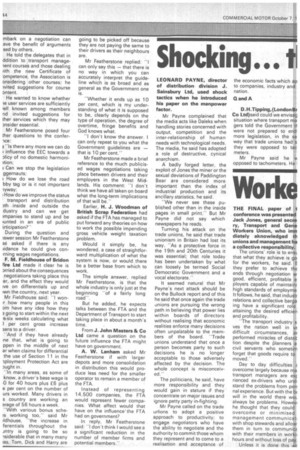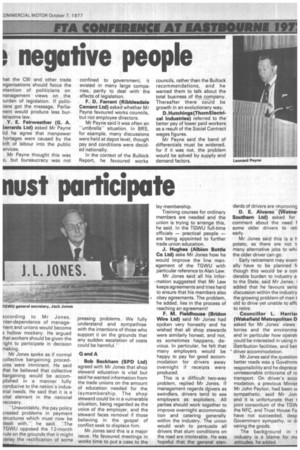Shocki n g... tl
Page 46

Page 47

If you've noticed an error in this article please click here to report it so we can fix it.
negoti e people
LEONARD PAYNE, director of distribution division J. Sainsbury Ltd, used shock tactics when he introduced his paper on the manpower factor.
Mr Payne complained that the media acts like Daleks when handling stories concerned with output, competition and the inter-relationship of human needs with technological needs. The Media, he said has adopted a role of destructive, cynical anarchism.
A badly forged letter, the exploit of Jones' the miner or the sexual deviations of Paddington Bear are considered more important than the index of industrial production and its ancillary statistics, he said.
"We never see these published other than in the inside pages in small print," But Mr Payne did not say which newspapers he reads.
Turning his attack on the trade unions, he said that trade unionism in Britain had lost its way. "As a protective force in the 19th and 20th Centuries it was essential; that role today has been undertaken by what can loosely be termed Social Democratic Government and a vocal electorate."
It seemed natural that Mr Payne's next attack should be on the Bullock report and of this he said that once again the trade unions are pursuing the wrong path in believing that power lies within boards of directors without realising that economic realities enforce many decisions often unpalatable to the members of the board.'Trade unions understand that once a person becomes party to such decisions he is no longer acceptable to those adversely affected by the decision. The whole concept is misconceived."
The politicians, he said, have more responsibility and they would gain in stature if they concentrate on major issues and ignore petty party in-fighting.
Mr Payne called on the trade unions to adopt a positive approach to productivity; to engage negotiators who have the ability to negotiate and the authority to commit those whom they represent and to come to a realisation and acceptance of the economic facts which ap to companies, industry and nation.
Q and A D .H .Tipping,(London Br Co Ltd)said could we envisag situation where transport ma gers told the Government II were not prepared to end more legislation, in the sa way that trade unions had s they were opposed to tac meters.
Mr Payne said he v% opposed to tachometers. He: hat the CBI and other trade rganisations should focus the mention of politicians on nanagement views on the wrden of legislation. If politi:ians got the message, Parlianent would produce less burlensome law.
Y. E. Fairweather (G. A. l'errards Ltd) asked Mr Payne lid he agree that manpower hortages were caused by the !rift of labour into the public en/ ices.
Mr Payne thought this was o, but bureaucracy was not confined to government, it exist d in many large companies, partly to deal with the effec s of legislation.
F. D. Farrant (Ribblesdale Ce nt Ltd) asked whether Mr Payn favoured works councils, but n t employee directors.
M Payne said it was often an "um rella" situation. In BRS, for e ample, many discussions were held at depot level, though pay and conditions were decided nationally.
In the context of the Bullock Report, he favoured works councils, rather than the Bullock recommendations, and he wanted them to talk about the total business of the company. Thereafter there could be growth in an evolutionary way.
D. Hutchings (Thorn Electrical Industries) referred to the' better pay of lower paid workers as a result of the Social Contract wages figures.
Mr Payne said the band of differentials must be widened, for if it was not, the problem would be solved by supply and demand factors.












































































































